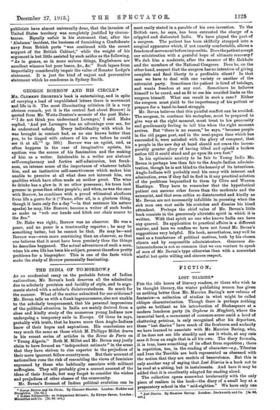THE INDIA OF TO-MORROW.f
As an academical essay on the probable future of Indian nationalism, Mr. Bevan's book deserves all the admiration due to scholarly precision and lucidity of style, and to argu- ments stated with a scholar's disinterestedness. So much for the manner. What of the matter submitted for our criticism? Mr. Bevan tells us with a frank ingenuousness, also not unakin to the scholarly temperament, that his personal impressions of the political situation in India are mainly derived from a close and kindly study of the numerous young Indians now undergoing a temporary exile in Europe. Of these he says, probably with truth, that be knows more than Anglo-Indians know of their hopes and aspirations. His conclusions are very much the same as those which M. Philippe Millet draws in his recent series of articles in the Revue de Paris on "Young Algeria." Both M. Millet and Mr. Bevan may justly claim to have formed an "independent estimate" in the sense that they have striven to rise superior to the prejudices of their more ignorant fellow-countrymen. But their account of nationalism runs the risk of resembling the views of feminism expressed by those who habitually associate with militant suffragists. They will probably give a correct account of the ideas of their friends, but may forget to consider the wishes and prejudices of other classes of the community.
Mr. Bevan's forecast of Indian political evolution can be
• George Borrow mid his Circle. By Clement Shorter. London: Hodder and Ston_ghton. [7s. 6d.] 'adieu Nationalism: an Independent Esti:nate. By Edwyn Bevan. London : Macmillan and Co. [2s. 6d. net.] most easily stated in a parable of his own invention. To the British race, he says, has been entrusted the charge of a crippled and dislocated India. We have played the part of a surgeon. The patient has been skilfully strapped into a surgical apparatus which, if not exactly comfortable, allows a freedom of movement before impossible. Does the patient accept our ministration with a grateful hope of ultimate recovery P We dub him a moderate, after the manner of Mr. Gokhale and the members of the National Congress. Does he, on the other band, suspect that the surgeon has no intention of giving complete and final liberty to a profitable client? In that case we have to deal with one variety or another of the extremist party. Sometimes the patient is tired of tutelage, and wants freedom at any cost. Sometimes he believes himself to be cured, and as fit to use his unaided limbs as the surgeon himself. What can result in such a case ? Either the surgeon must yield to the importunacy of his patient or prepare for a hand-to-hand struggle.
Mr. Bevan believes that this painful conflict can be avoided. The surgeon, to continue his metaphor, must be prepared to give way at the right moment, must trust to his generosity and gentlemanly feeling to tell him when the right moment arrives. But "there is no reason," he says, "because people in the old pagan past, and in the semi-pagan time which has succeeded it, were satisfied with the glory of conquest, that a people in the new day at hand should not crave the incom- parably greater glory of having lifted and upheld a broken nation till it could stand and go upon its own feet."
In his optimistic anxiety to be fair to Young India Mr. Bevan is perhaps less than fair to the Anglo-Indian adminis- tration, though be is not blind to the honesty of its intentions. Anglo-Indians will probably read his essay with interest and admiration, even if they fail to find in it any practical solution of the problems bequeathed to them by Clive and Warren Hastings. They have to remember that the hypothetical patient can assume other forms than the moderate and the extremist, and that even critics so disinterested and kindly as Mr. Bevan are not necessarily infallible in guessing when the sick man can cast aside his crutches and dismiss his hired attendant. Perhaps the chief value of Mr. Bevan's little book consists in the generously altruistic spirit in which it is written. With that spirit no one who knows India can have any quarrel. Its application to practical affairs is a different matter, and here we confess we have not found Mr. Bevan's suggestions very helpful. His book, nevertheless, may well be used as a touchstone of political motives, both by his chosen clients and by responsible administrators. Generous dis- interestedness is not so common that we can venture to speak of men of Mr. Bevan's type otherwise than with a somewhat wistful but (mite willing and sincere respect.


































 Previous page
Previous page